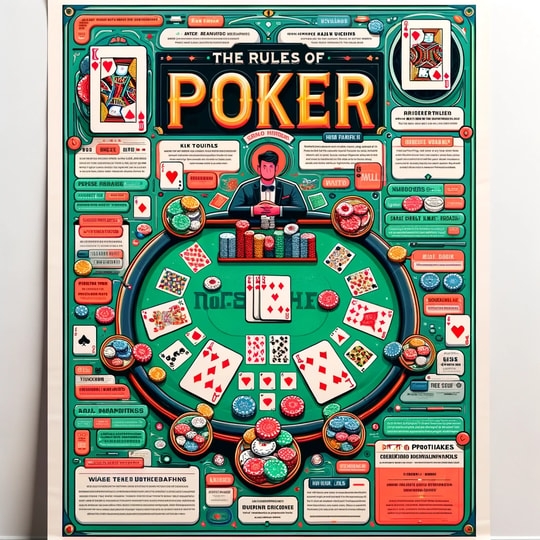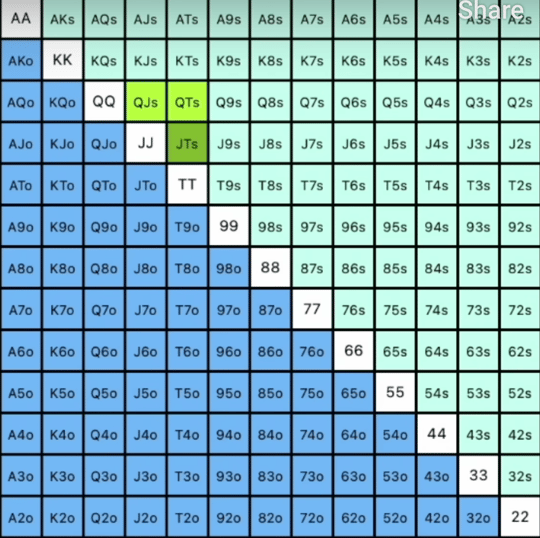
The Controversial RTA (Real Time Assistance): Why Poker Sites Are Banning It


Poker ToolsBlogCrunching Numbers Like a Pro: Mastering Equity Calculators
Poker equity calculators help make better decisions. This guide shows how to use them effectively.
"Is it cool to use a poker equity calculator?" I've been pondering this conundrum quite a bit. These calculators, they can dish out info that could potentially up your game. But, it also feels a tad sketchy, like counting cards in blackjack - not that I would know anything about that, of course. "Yeah, it ups your odds, but is it right?" The rules on online sites are as clear as mud, so naturally, it's a hot topic. For now, I'm gonna play it safe and rely on my skills and past games. Still, I have this itch to try one out, just to see if it really gives an advantage.
This guide might help me decide and clear up the confusion once and for all. Are equity calculators the holy grail of poker tools, or should they stay banned like a bad habit? I don't know, but I'm open to convincing arguments. Time to dig in and learn...or at least pretend to.
Ever wondered, "Can I use an equity calculator in online poker?" Well, it's totally legal and can seriously up your game. Are you using poker equity calculators to their full potential? If not, maybe it's time to level up - don't be a dinosaur! Don't let confusion stop you; this guide will clear things up. Equity calculators: confusing or a must-have? You're about to find out. But before we dive in, there are a few important things to note.
Now, let's talk about the tool itself. Equity calculators are usually seen as strategy tools, not cheating devices (sorry, no shortcuts here!). But it's important to understand how they can help or hurt your gameplay. This brings us to the thin line between strategy and unfair advantage. An equity calculator can give you a serious edge in play, but using it to take advantage of other players could be seen as not cool :( Remember, an equity calculator isn't a magic trick. It's a tool, not a surefire way to win. It helps with decision-making, but skill and experience still matter. Lastly, keep it real. The most satisfying wins come from a mix of your instincts, skills, and strategic thinking. Use tools wisely, but remember that real poker expertise comes from continuous learning and practice - no app can replace that! Ready to step up your poker game? Let's jump into the world of poker tools.

As a poker fan, I often find myself pondering - is it legal to use equity calculators in online poker tournaments? Some players feel they give an unfair advantage (boo, hiss!), while others see them as a way to improve their game. So, what do the rules say about using an equity calculator in online poker tournaments? Well, the answer mostly depends on the specific poker site. Each online poker site has its own unique set of rules and regulations, which can be as different as chalk and cheese from one site to another.
Talk about being a party pooper, right? In conclusion, it's up to each player to get to know the rules and regulations of their chosen poker site. While equity calculators can be a handy tool (wink, wink), it's important to remember that they can't replace a solid poker strategy. Because let's face it, there's no substitute for good old-fashioned skill!
I've been using the same old settings on my poker equity calculator for ages. I'm starting to question if I'm really getting all I can out of it - or am I just bluffing myself? Can I tweak the ranges and frequencies to better match my personal poker game? My game is usually pretty straightforward
so maybe I should cut down the hand ranges I put in. But, I do love a good draw. Should I add more suited connectors to see how they do? And what about when I'm feeling gutsy and play more hands? It makes sense that I'd need to up the bluff frequencies to keep things balanced. The more I ponder, the more I realize that sticking to the standard default settings isn't the best move.
To really get the most out of my equity calculator, I need to set it to my actual game, not just the ideal game.
I'll wait to form an opinion until I've given it a shot. So, stay tuned for the next episode of 'Poker Calculator Chronicles'! :)
If you play poker, you probably know about equity calculators and how they can help you make better choices. You can change these calculators to fit your own style of play - isn't that handy? For example, if you're a bold player (and I mean BOLD), you need an equity calculator that considers the outcomes of your bets. By adjusting your calculator's settings, it can mirror your game style, which might increase your chances of winning - or so we hope :) One way to adjust your calculator for bold play is by:
Another thing to adjust is:
Equity calculators are handy tools for poker players, and you can modify them to match your game style. Adjusting your calculator settings for bold play could possibly improve your performance at the poker table. Just remember to regularly check and change your calculator settings to make sure they accurately reflect your game style. And hey, who knows? Maybe one day you'll be the next poker superstar! Haha.
As a seasoned poker player, I've always played it safe and defensive. But then - plot twist - I noticed that my poker calculator was set up for a more aggressive style, which didn't match how I play. So, I tweaked some settings to better fit my style. The change in my game was pretty obvious.
Now, when I'm faced with a tough decision, I can count on my poker calculator to help me make the right call. This is something every poker player should be able to do, no matter their style.
Here are some key points:
In short, understanding and adjusting your poker tools to fit your style can really improve your game. So, it might be worth taking a closer look at your settings. You might find that a few tweaks could lead to a winning hand. Or not, who knows? It's poker after all! :)
As a poker player, I used to set my equity calculator super wide, trying to use every edge I could. But, alas, this often led to losing chips when the cards weren't on my side :( This made me rethink how to use this tool right. Self-questioning, it seems, is part of finding balance. After many tries (and trust me, there were many), I've learned to limit my equity settings when the cards are bad. Sure, this means folding more, but hey, it saves money in the long run. On the flip side, when the cards are good, I loosen up the restrictions to make more during good times - because who doesn't like good times? Changing your play style and calculator settings based on what's happening at the table is key.
There's no one-size-fits-all answer, but with time, you'll find the best balance for different situations. Equity calculators don't play the game for you - they just give insights. The rest is up to your poker instincts. This process of self-discovery and adjustment has been a big part of my poker journey. It's a constant learning process, where each hand dealt teaches something new. As the game goes on, so does my understanding of how to use these tools effectively. With years of experience as a poker player and copywriter, I can confidently say that finding the right balance in equity calculator settings is crucial for success.
Mastering poker involves more than just having the best hand; it requires knowing when to hold 'em, when to fold 'em, and how to smartly use your tools. Keep improving your skills, keep adjusting, and remember - the game requires as much strategy as it does luck. So, good luck with that! ;)

Ever played in a poker tournament, heart racing as you plan the perfect bluff? I have. ;) I wondered, 'Can a tournament equity calculator help me bluff better?' Looks like it can!
But am I using this tool to its full potential? Nope, not even close.
I need to up my game and get rid of any confusion about equity calculators.
They're not just confusing gadgets - they're key tools for strategic play.
Who knew, right?
Using equity calculators for bluffing in poker is a pretty cool idea, or so I thought. I remember the first time I tried one; at first, I was like, 'How can a software tell me when to bluff? Isn't poker more about skill?' But, being the adventurous soul that I am, I gave it a shot anyway. I put in my hand, the board, and what I thought my opponent had into the calculator. Lo and behold, it showed that I had a good chance of winning with a big bluff. Even though I wasn't sure, I went for it. And guess what? It worked! My opponent folded his middle pair face up, and I won.
That's when I realized how useful these calculators are - they're like a secret weapon in your poker arsenal. They give solid advice in any poker situation, showing if a bluff will work or not. Now, I use them all the time, especially in tournaments. They help me find the best times to bluff to win chips and make profitable runs.
So, are you using equity calculators to their full potential? It's time to stop just trusting your gut - the numbers don't lie. These tools can really level up your poker game. You'll be happy you started using them. They're an awesome tool that helps improve our bluffing skills!
But before you go all in on this (pun intended), there are some downsides.
The tool gives useful info, but it should be used along with other poker skills. So, ready to fully use equity calculators and level up your poker game?
As a poker player, I've seen a lot of mistakes when it comes to using equity calculators.
It's like using a hammer to put in a screw; sure, it might work, but it's not the best way to do it. Haha, talk about a square peg in a round hole!
This can lead to wrong results and big mistakes. You gotta remember that equity calculators are just tools to help you make better decisions; they shouldn't be the only thing you rely on. But hey, who am I to judge? Keep using that hammer for your screws if you want ;)

Remember, the best poker players are those who can switch up their game fast when things change. So don't just obsess over the numbers and forget about the other key parts of the game. After all, it's not like we're playing 'Count the Numbers', haha!
As a poker player, I've seen many beginners not thinking about the game's flow when using equity calculators. It's like using GPS to get around a new city without knowing the traffic situation - you can't just put in your destination and expect the GPS to tell you when to speed up or slow down.
The same goes for poker. You need to understand each hand's specific conditions, including how your opponents are playing, to make the best choices. If not, you're just following what the equity calculator says, which could lead to messing up.
So, before you play, make sure you fully understand the game and the tools you have.
To wrap this up, poker equity calculators are powerful tools, but using them wrong can lead to costly mistakes.
Lastly, while poker tools like equity calculators can be super helpful, they should never replace a deep understanding of the game and its flow. Use them wisely, and remember - poker is as much about understanding people as it is about calculating odds. And hey, who said poker was easy? :)
Man, I can be so forgetful! There I was, in the middle of a big tournament, in a high-stakes game, when it hit me - I forgot to update my equity calculator settings again! This keeps happening and it's messing with me :( Am I not taking this seriously enough?
Should I be more careful about adjusting my calculator between games? It only takes a few clicks and I'd have the latest stats to help me out. But, I get caught up in the excitement and drama, forgetting that my strategy has changed since I last set up the calculator.
It's clear that I need to quit this bad habit if I want to move up in the poker world. Making dumb mistakes because of outdated equity reads - is this how I want to be known at the tables? Heck no. I need to focus and keep my calculator settings updated from now on. I trust my skills if I just use all the tools I have. No more putting it off - I'm determined to master the equity calculator setup. And who knows, maybe then I'll stop donating to the 'Help Other Players Win' fund, haha!

This article was written, checked and verified by multiple authors to ensure maximum accuracy and up to date data. We strive for providing the best and most helpful resources about Poker Tools available.

Have suggestions or want to become an author for our poker tools magazine as well?
 BetterChecked. All rights reserved.
BetterChecked. All rights reserved.The information provided on the Website is for general informational purposes only. All information on the Website is provided in good faith, however, we make no representation or warranty of any kind, express or implied, regarding the accuracy, adequacy, validity, reliability, availability, or completeness of any information on the Website. Under no circumstance shall we have any liability to you for any loss or damage of any kind incurred as a result of the use of the Website or reliance on any information provided on the Website. Your use of the Website and your reliance on any information on the Website is solely at your own risk.
Some of the links on the Website may be affiliate links. This means that if you click on these links and make a purchase, we may receive a small commission at no additional cost to you. This helps support the operation of the Website and allows us to continue providing content to you.
The Website and its operators are not associated, affiliated, endorsed, or sponsored by any companies or websites mentioned on the Website, nor have they been reviewed, tested, or certified by them. All logos, images, and other third-party materials belong to their respective owners and any use of these materials is solely for informational purposes.
All copyrights, trademarks, and other intellectual property rights in and on the Website and all content on the Website, including but not limited to text, graphics, logos, icons, images, and software, belong to their respective owners and are protected by applicable copyright and trademark laws.